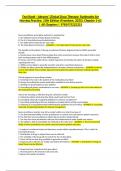Exam (elaborations)
Test Bank - Abrams’ Clinical Drug Therapy: Rationales for Nursing Practice, 13th Edition (Frandsen, 2025), Chapter 1-61 | All Chapters | 9781975222321
- Course
- Institution
- Book
Test Bank - Abrams’ Clinical Drug Therapy: Rationales for Nursing Practice, 13th Edition (Frandsen, 2025), Chapter 1-61 | All Chapters | 9781975222321
[Show more]



